Proactive Interference
What is proactive interference and how does it affect memory formation? Discover the facts and implications for instructional practice in this article.


What is proactive interference and how does it affect memory formation? Discover the facts and implications for instructional practice in this article.
Psychologists have been trying to find out what makes people forget just as much as they are keen to know what makes people remember. Various different theories describing why people forget have been put forwarded.
| Aspect | Proactive Interference | Retroactive Interference |
|---|---|---|
| Definition | Old information interferes with learning new information | New information interferes with recalling old information |
| Direction | Past → Present (old blocks new) | Present → Past (new blocks old) |
| Classroom Example | Previous Spanish vocabulary makes it harder to learn French words | Learning French words makes it harder to recall previously learned Spanish |
| Common Scenario | Difficulty remembering new phone number because old one keeps coming to mind | Can't remember old phone number after learning new one |
| Teaching Strategy | Acknowledge prior knowledge, explicitly compare old vs. New concepts, spacing practice | Regular review of previously learned material, interleaved practice, retrieval practice |
According to the interference theory, people may fail to retrieve details from their long-term memory because competing 'chunks' of information interfere. This is particularly problematic because interference affects working memory, making it harder for students to process new information effectively.
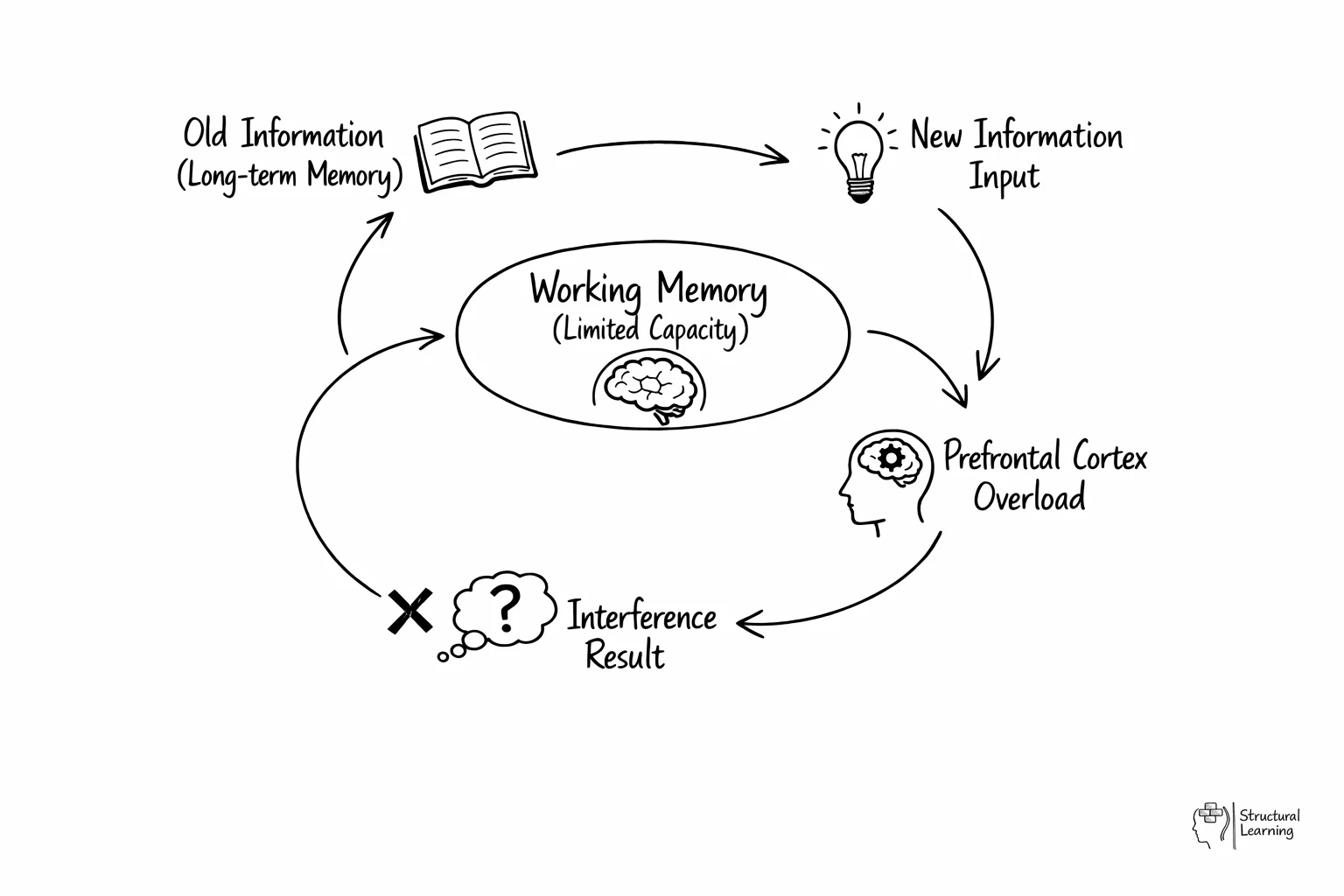
When several pieces of information compete in people’s long-term memory, particularly if details are similar, this results in some information being either hard to remember or totally forgotten.
Proactive interference occurs when previously learned information interferes with learning and remembering new information. This happens because short-term memory can only hold a limited amount of information at a time.
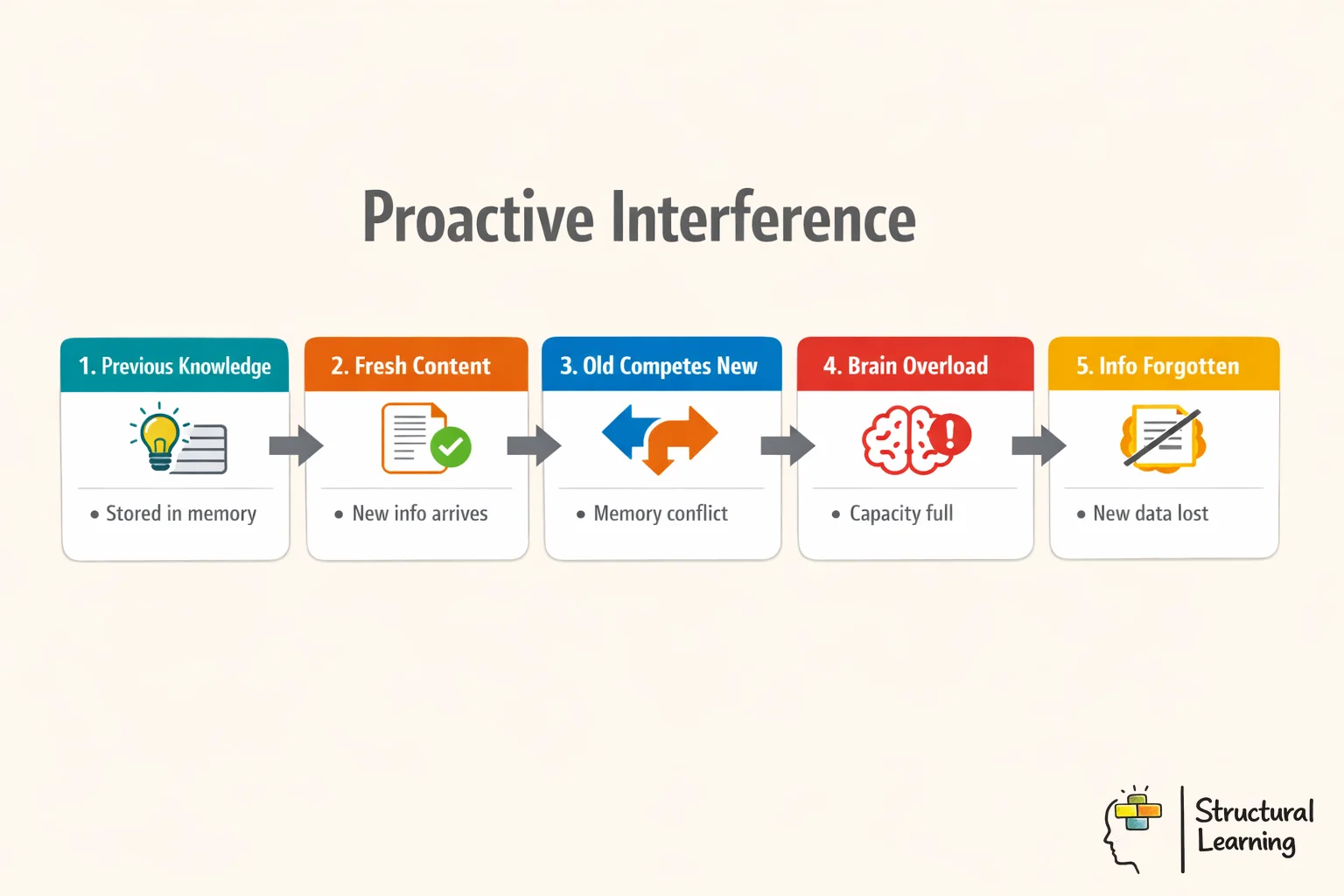
When new information is introduced, it can be difficult for the brain to process and store it if too much information is already competing for space in short-term memory. This demonstrates how interference affects working memorycapacity. This is why actively work to reduce proactive interference by organising and prioritising information in a meaningful way.
Research suggests that neural mechanisms play a key role in proactive interference. Specifically, the prefrontal cortex, which is responsible for working memory and attention control, may become overloaded when too much information is competing for space.
Additionally, the hippocampus, which is involved in long-term memory, may also be affected by proactive interference. By understanding these neural mechanisms, we can develop strategies to reduce proactive interference and improve our ability to process and retain new information.
Proactive interference occurs when previously learned information disrupts the ability to learn and remember new information. This happens because old memories compete with new ones for limited space in working memory, making it harder for the brain to process and store fresh information. The interference is particularly strong when the old and new information share similar characteristics or contexts.
Proactive interference occurs when a person is not able to remember new information because old information stops the retrieval of new information. In simpler words, proactive inhibition occurs when old information interferes with new information retrieval.
Older information is mostly more strongly stored in long-term memory as the person has revisited and rehearsed older information for longer.
Consequently, it is easier to recall older information than current memories. Research shows that it is possible for a person to reduce proactive inhibition by rehearsing new information through recitation or testing.
Interestingly, as people grow older, proactive interference becomes more apparent. The number of memories saved in an older person's memory span is much more than a younger individual's, increasing the individual differences in the chances of occurrence of proactive interference.
Previous studies show that peripheral processes (motor execution and encoding time) and recognition memory worsen with the increase in age differences between individuals.
FMRI and recent-probes tasks can be used to assess the brain mechanisms responsible for resolving proactive interference i.e. Left anterior prefrontal cortex and the ventrolateral prefrontal cortex.
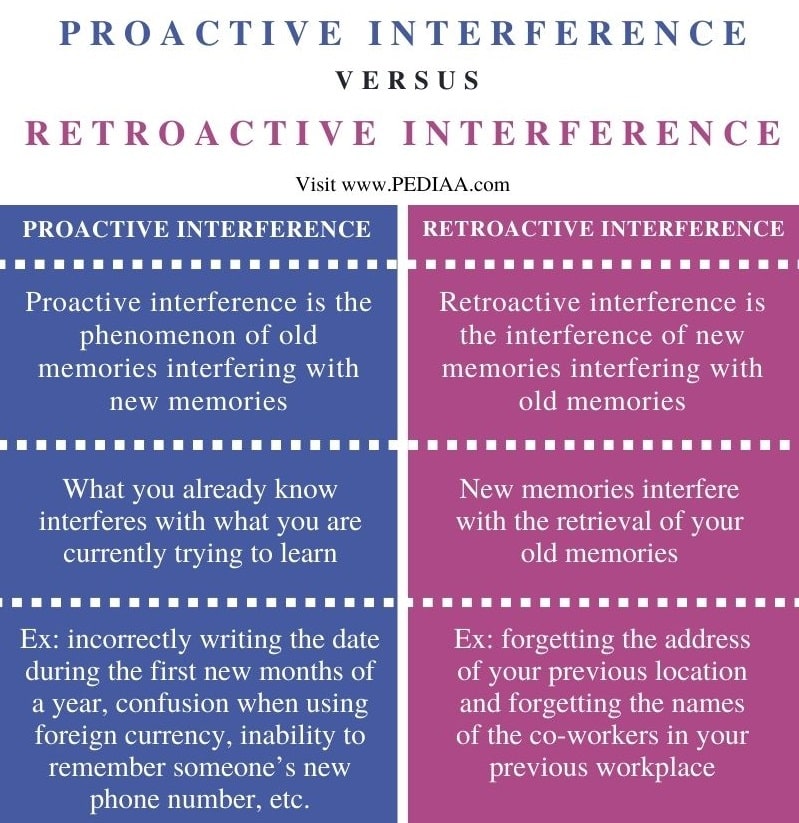
Students writing last year's date in February is a classic example of proactive interference, where old learning blocks new information. Language learners often struggle when previous vocabulary interferes with new words, such as Spanish speakers mixing up similar-sounding English words. Athletes may find old techniques interfering when learning new skills, making it harder to master updated methods.
One may experience proactive interference every time his old practices interfere with learning something new.
Proactive interference is a common phenomenon in the field of memory and cognition. For instance, if you learned to drive a manual car and then switched to an automatic, you may find yourself struggling to remember not to use the clutch.
This is because the old memory of driving a manual car is interfering with the new memory of driving an automatic. By understanding the concept of proactive interference, you can take steps to minimise its impact on your ability to learn and retain new information.
Another example of proactive interference can be seen in short-term memory. When trying to remember a new phone number, a person may struggle if they have previously memorized a different phone number that is similar in sequence.
The old memory interferes with the ability to recall new information. To combat this, one can try to actively forget the old information or use mnemonic devices to help differentiate between similar memories.
One of the most common examples of proactive interference is seen during the first few weeks or even months of a new year.
During this time, people tend to write the dates of the previous year because they have frequently rehearsed the past year and for them, it is easier to recall the previous year than the new year. Hence, their memories of the previous year interfere with their ability to remember that they have to write the date according to new the year.
If a person is trying to learn French, but has already learned German, he may frequently find themself using German words instead of French words. Or, if a native English speaker tries to learn Italian in control conditions he may confuse English language rules with that of Italian. Their old memories of English words in their mind interfere with the new learning, making it more difficult to remember the rules of Italian.
Teachers frequently face problems in remembering the new students' names and confuse new students names with the names of students they had in past years. Even teachers with many years of teaching experience may confuse the names of students with names of their parents or siblings!
When traveling to a new country, people are likely to face difficulty while using the foreign currency. It is because their previous knowledge of using native currency interferes with their ability to effectively use a new currency.
A person may face difficulty, in case of changing his diet, and learning a new list of things to purchase at the store. During grocery shopping, old purchases memory may interfere with remembering the new things in the shopping list, making it hard to remember new names while grocery shopping in the store.
Teachers can reduce proactive interference by clearly distinguishing new information from previously learned material through explicit comparison and contrast activities. Organizing information into meaningful categories and using spaced practice helps separate competing memories. Active retrieval practice with immediate feedback allows students to strengthen new learning while weakening interference from old information.
The following steps might help us to decrease the impact of proactive interference in every life:
One may reduce the effect of proactive interference on memory and cognition by paying due attention to the new information. In control conditions, this can be achieved through active learning or testing.
Active learning is an overarching strategy for instruction which involves active engagement with the study materials through discussion, problem-solving, case studies, application reviewing, and other ways.
Previous experiments suggest that it improves the performance of the brain and offers an opportunity to connect old information with new information. Hence, it is suggested to study the target concept repeatedly until achieving a mastery of the topic or the skill.
To avoid proactive interference, it is suggested to add novelty to the new information that needs to be retained. One may make a mnemonic, song, or rhyme to add uniqueness to the topic in one’s memory.
It may become easier to recall new information by making it memorable and different from past memories.
This is because proactive interference occurs when past memories interfere with the retrieval of new information from short-term memory. By adding novelty to new information, you can create a distinct memory that is less likely to be confused with past memories and, therefore, easier to recall.
This can be done through the use of unique images, associations with personal experiences, or even just changing the format in which the information is presented. Adding novelty can be especially helpful in situations where you need to remember a lot of new information in a short amount of time.
Overlearning can be applied to new information to reduce interference. Overlearning means to practise the new learning repeatedly, even after mastering the topic. Frequent practise can help support overlearning and improves chances of better retention of current information.
Practising can be used to make sure that the information stays in long-term memory and improves recollection and learning performance.
However, overlearningcan also have its limitations. One study found that overlearning can actually decrease visual working memory capacity, which is the ability to hold and manipulate visual information in short-term memory.
This means that while overlearning can be helpful in retaining information, also to give your short-term memory time to rest and process the information in order to maintain a healthy balance.
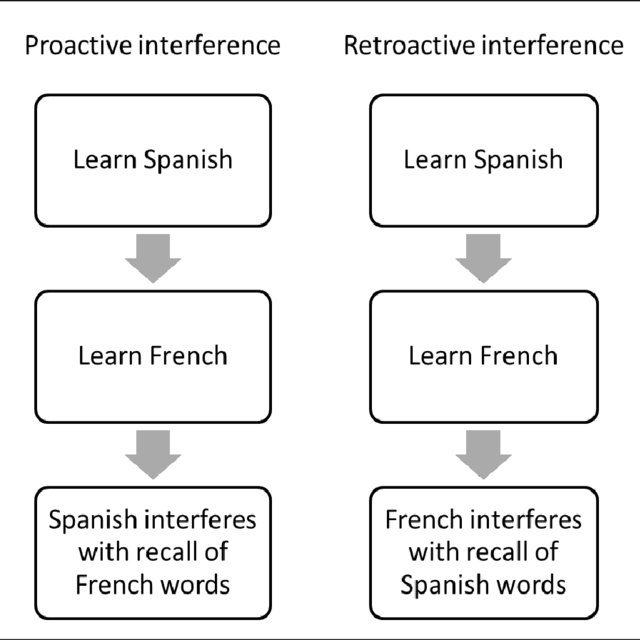
Many researchers studied the neural mechanisms and individual differences between retroactive and proactive interference. Retroactive interference occurs when a person cannot recall old memories or fails to retrieve details from their short-term memory, as new memories stop their retrieval. In basic terms, new information interferes with the old information retrieval.
Previous trials suggest that inhibitory control associated with retroactive interference may disrupt learning. In an experimental trial, students learned some Japanese, German word pairs, and then they were given different language word pairs as an interference task.
The trial participants were provided with the interference task after a few minutes of the learning task. According to the findings of experiments, the interference task led to a decrease in learning up to 20% irrespective of how long the practice trial group waited between being presented with both tasks.
These experimental trials show that interference may have a negative impact on memory consolidation.
Some examples of Retroactive Interference in people’s everyday life are as follows:
In 1885, a German psychologist, Hermann Ebbinghaus proposed the theory of decay for the first time. The decay theory states that a memory trace is developed at the time of the formation of a new theory.
Hermann Ebbinghaus's forgetting curve is a theory that explains how memory retention declines over time when there is no attempt to retain the information. According to Ebbinghaus, memory retention drops rapidly within the first few hours after learning new information and then levels off.
This curve suggests that without any effort to retain information, we forget most of what we learn within a short period of time. However, the study mentioned in the context suggests that proactive interference can slow down the decay of memory traces and potentially improve memory retention over time.
Short-term memory plays a significant role in proactive interference. The forgetting curve shows that information we learn is quickly forgotten without any effort to retain it. However, when we actively try to remember information, it can be stored in our short-term memory.
By actively working to retain information and reducing proactive interference, we can improve our memory retention over time.
Previous experiments suggest that with the passage of time, these memory traces fade out and finally disappear. If a person does not retrieve and rehearse information, it will eventually be discarded.
The Decay Theory has been a topic of debate among researchers for years. Some trials have supported the theory, while others have found evidence to contradict it.
One study published in the Journal of Memory and Language found that proactive interference, or the interference of previously learned information on new information, can slow down the decay of memory traces. If you continue to rehearse and retrieve information, it may not fade away as quickly as previously thought.
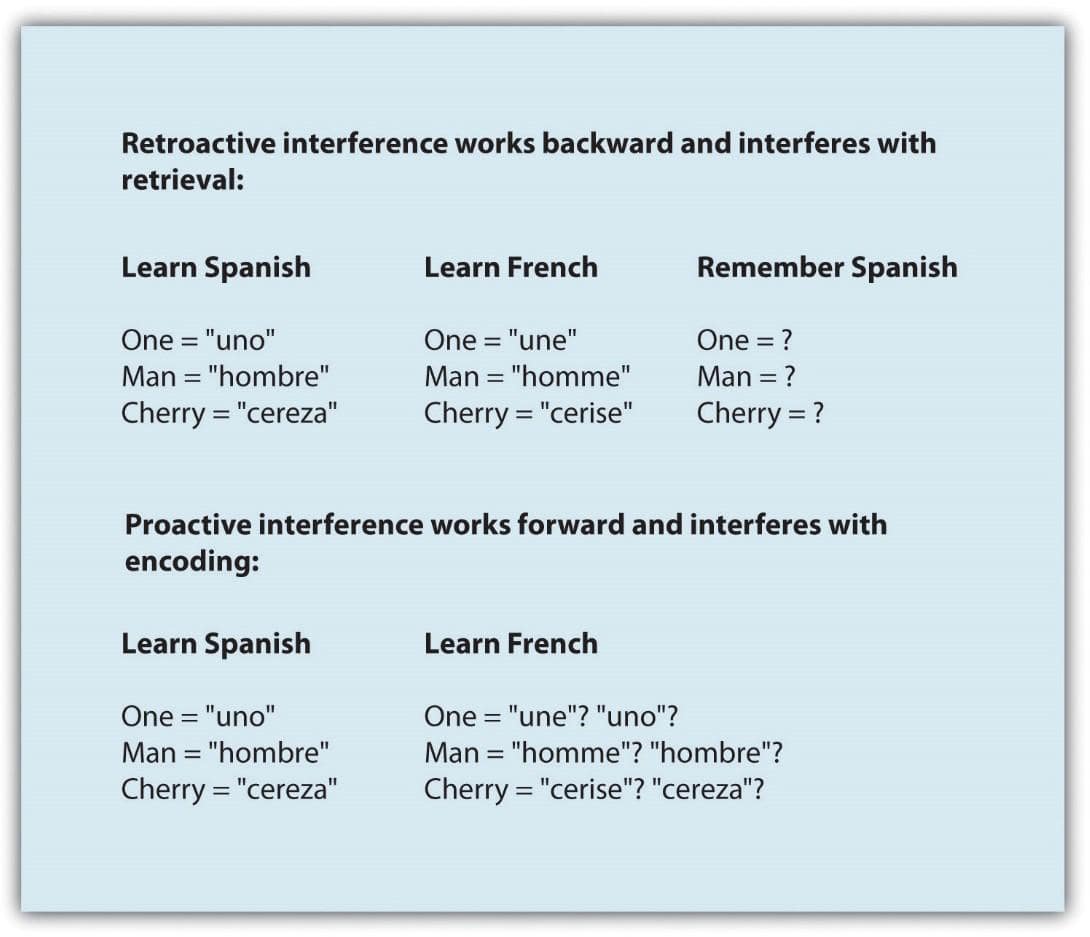
Dual task interference occurs when students attempt to perform two cognitive tasks simultaneously, causing performance to decline on one or both activities. This happens because working memory has limited capacity and cannot effectively process multiple complex tasks at the same time. Teachers see this when students struggle to take notes while listening to explanations, as both tasks compete for the same cognitive resources.
People face difficulty performing two relatively simple tasks at the same time. In modern times, dual-task situations are increasingly common, such as people use mobile phones while driving, cooking, or writing.
Dual-task interference or cognitive-motor interference occurs when the simultaneously performing a motor and cognitive processes leads to a decline in performance in both or just one task. There are a number of theories and previous experiments describing the Dual task interference in humans such as the cross-talk and the capacity-sharing theories.
One explanation for dual-task interferenceis related to short-term memory. When performing two tasks simultaneously, the brain must divide its attention between them, which can lead to a depletion of short-term memory resources.
This can result in difficulty in retaining information related to both tasks, and can ultimately lead to a decline in performance. Note that the degree of interference can vary depending on the complexity of the tasks and the individual's cognitive abilities.
Output interference happens when the act of retrieving one memory makes it harder to recall related information stored in memory. This occurs because accessing one piece of information can temporarily block or suppress similar memories that are competing for retrieval. Students experience this during tests when remembering one answer makes them forget a related answer they knew moments before.
Output interference defines the process in which accuracy lowers in an episodic test of memory. Previous experiments demonstrate that the Output inference in sequential recall leads to a reduction in intrusion and correct responses and an increase in failed responses in the memory test.
In order to better understand the effects of output interference, researchers have conducted studies using positive trials. These trials involve presenting participants with a list of items to remember, and then testing their memory by asking them to recall the items in order.
By manipulating the level of output interference, researchers can observe the impact on the number of correct responses and failed responses. These studies have shown that output interference can significantly decrease accuracy in memory tests, highlighting the importance of minimising interference in learning and memory processes.
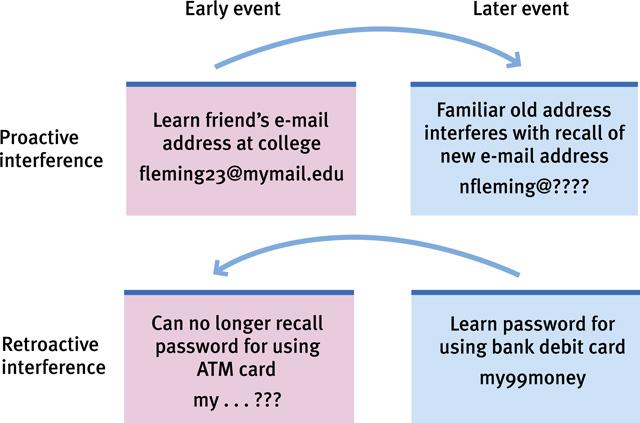
Proactive interference can create false memories when previous experiences blend with new information, causing people to remember things that never actually happened. The brain sometimes fills gaps in memory with details from similar past events, creating confident but incorrect recollections. This is particularly common in classroom settings where students may confidently recall a version of events that combines elements from multiple lessons or experiences.
A false memory is different from a proactive and retroactive interference because it is a recollection that appears real in a person’s mind but is partially or totally fabricated. An example of a false memory is thinking that a person forgot to lock the door before leaving home.
Misattribution of the actual source of the information or misinformation are the factors leading to false memory. Current knowledge and other memories may also interfere with the creation of a new memory, causing the false or incorrect recollection of an event.
Short-term memory can also play a role in false memory. When we are exposed to new information, it is temporarily stored in our short-term memory before being transferred to long-term memory. However, if we are presented with similar information shortly after, it can interfere with the initial memory formation and lead to confusion and false recollection.
This is why pay attention to the details and context of new information to avoid the creation of false memories.
Critics argue that proactive interference theory oversimplifies memory processes by focusing too heavily on competition between memories rather than considering how memories can also facilitate new learning. Some researchers question whether laboratory studies of interference accurately reflect how memory works in real-world educational settings. Additionally, the theory struggles to explain why some previously learned information actually helps rather than hinders new learning in certain contexts.
A lot of psychological review research has been carried out to study the impacts of proactive and retroactive interference. But, there are some problems with these theories.
Most trials on interference theory occur in a lab involving word memory tasks. In the real world, people do not perform word memory tasks frequently. Due to this, most psychological review research on proactive interference & retroactive interference may not be applicable to the real world.
However, there have been positive trials that support the existence of proactive interference in real-world scenarios. For example, individuals who learn a new language may experience proactive interference from their previous language, making it harder for them to recall new vocabulary.
Additionally, individuals who frequently change jobs may experience proactive interference when trying to remember new job responsibilities. While there may be critiques of interference theory in certain contexts, there is evidence to suggest that proactive interference can have real-world implications.
Key academic sources include research by Baddeley and Hitch on working memory, which provides foundational understanding of how interference affects cognitive processing. Educational psychology textbooks by authors like Woolfolk and Santrock offer practical applications for classroom settings. Current research in journals like Memory & Cognition and Educational Psychology Review provides the latest findings on interference effects in learning environments.
Here are four key studies on proactive interference. These studies provide insights into proactive interference and its impact on memory performance, short-term retention, and cognitive development, with applications ranging from understanding brain mechanisms to improving learning strategies in language learners.
1. Developmental change in proactive interference by R. Kail (2002)
Summary: This study shows that proactive interference decreases from ages 4 to 13, with younger children exhibiting less accurate short-term memory recall, suggesting changes in brain mechanisms related to memory performance.
2. Intratrial proactive interference in pigeon short-term memory: Manipulation of stimulus dimension and dimensional similarity by D. S. Grant (1982)
Summary: The research demonstrates robust proactive interferencein pigeons' short-term memory, regardless of stimulus dimension, affecting their visual working memory capacity and reaction time.
3. The critical role of retrieval processes in release from proactive interference by K. Bäuml & Oliver Kliegl (2013)
Summary: This study emphasises the role of retrieval processes in reducing proactive interference, leading to focused memory search and decreased response latencies, relevant to neurobiological mechanisms in memory tasks.
4. Implicit Proactive Interference, Age, and Automatic Versus Controlled Retrieval Strategies by Simay Ikier, Lixia Yang, L. Hasher (2008)
Summary: This study indicates that proactive interference in implicit memory is more harmful for older adults, with controlled retrieval processes being effective primarily for younger adults, affecting semantic memory and dual-task interference.
Proactive interference occurs when previously learned information interferes with learning and remembering new information, essentially causing old memories to block or compete with new ones. Educators should care because it explains common classroom challenges like students writing last year's date in February or language learners mixing up vocabulary from different languages. Understanding this concept helps teachers recognise when students' difficulties aren't due to lack of effort but rather natural memory processes that can be addressed with proper strategies.
Teachers can spot proactive interference when students consistently revert to previously learned methods, rules, or information despite being taught new approaches. Common signs include language learners mixing vocabulary from different languages, students applying old mathematical procedures to new problems, or pupils struggling to adapt to updated techniques in subjects like ICT or science. The interference is particularly noticeable when old and new information share similar characteristics or contexts.
Teachers can reduce proactive interference by explicitly comparing and contrasting new information with previously learned material, helping students recognise the differences. Organising information into meaningful categories and using spaced practice rather than massed practice allows the brain to better distinguish between old and new learning. Additionally, encouraging active rehearsal of new information through recitation, testing, and regular review helps strengthen new memories so they can compete more effectively with older ones.
Older students have accumulated many more memories in their long-term memory stores, creating more opportunities for interference when learning new information. Research shows that as people age, the sheer volume of stored information increases the likelihood of proactive interference occurring. This explains why differentiation becomes crucial in mixed-age classrooms, as older students may need additional support to overcome the competing influence of their extensive prior knowledge.
In language learning, proactive interference occurs when students' native language or previously learned languages interfere with new vocabulary, grammar rules, or pronunciation patterns. Language teachers can combat this by explicitly highlighting differences between languages, using contrastive analysis to show how rules differ, and providing extra practice to strengthen new language patterns. Creating distinct contexts for different languages and using mnemonic devices can also help students compartmentalise their linguistic knowledge.
Unlike simple forgetting where information fades over time, proactive interference involves active competition between old and new memories, where previous learning actually blocks access to new information. The old information isn't forgotten but instead becomes so strongly established that it dominates retrieval processes. This means students may appear to 'forget' new learning when they're actually reverting to more deeply ingrained prior knowledge that's interfering with the new material.
These peer-reviewed studies provide deeper insights into proactive interference and its application in educational settings.
This theoretical framework explores integrating cognitive load theory 29 citations (Author, Year) with other psychological theories both within educational contexts and broader disciplines, offering insights into how mental processing capacity can be understood through multiple theoretical lenses.
Hanham et al. (2023)
This paper examines how cognitive load theory, which helps teachers design effective instruction based on how human memory works, can be integrated with other educational theories. For teachers learning about proactive interference, this is relevant because cognitive load theory provides frameworks for understanding how previous learning can interfere with new learning, and offers practical strategies to minimise this interference in classroom instruction.
The Evolution of Race-Focused and Race-Reimaged Approaches in Educational Psychology: Future Directions for the Field 31 citations
DeCuir‐Gunby et al. (2024)
This paper discusses how educational psychology theories can be expanded to better address racial equity and inclusion in educational settings. While not directly about proactive interference, this work is relevant to teachers because it highlights how traditional cognitive theories may need to be reimagined to account for diverse student experiences, including how prior cultural and social learning might interact with new academic content.
The Effect of an Extended Flipped Classroom Model for Fully Online Learning and its interaction with Working Memory Capacity on Students’ Reading Comprehension View study ↗18 citations
Diningrat et al. (2023)
This study investigates how flipped classroom models work in online learning environments and examines how students' working memory capacity affects their reading comprehension in this format. This is relevant to teachers interested in proactive interference because working memory is where interference between old and new information occurs, and understanding how different teaching formats interact with memory capacity can help teachers choose methods that minimise interference effects.
The impact of working memory capacity on collaborative learning in elementary school students 12 citations
Du et al. (2022)
This research explores how individual differences in working memory capacity influence the effectiveness of collaborative learning among elementary students. For teachers studying proactive interference, this work is important because it demonstrates how students with different memory capacities may experience varying levels of interference when working together, suggesting that collaborative activities need to be designed with memory limitations in mind.
Research on cognitive flexibility in wild birds 20 citations (Author, Year) reveals that individual differences in reversal learning are explained primarily by proactive interference rather than sampling strategies, providing insights into how birds adapt their learning approaches in natural environments across two passerine species.
Morand‐Ferron et al. (2022)
This study examines cognitive flexibility and learning in birds, finding that proactive interference from previous learning is the main factor that makes it difficult to adapt to new situations. Although conducted with animals, this research is valuable for teachers because it provides clear evidence of how prior learning can interfere with acquiring new skills, illustrating the fundamental nature of proactive interference across different types of learning.